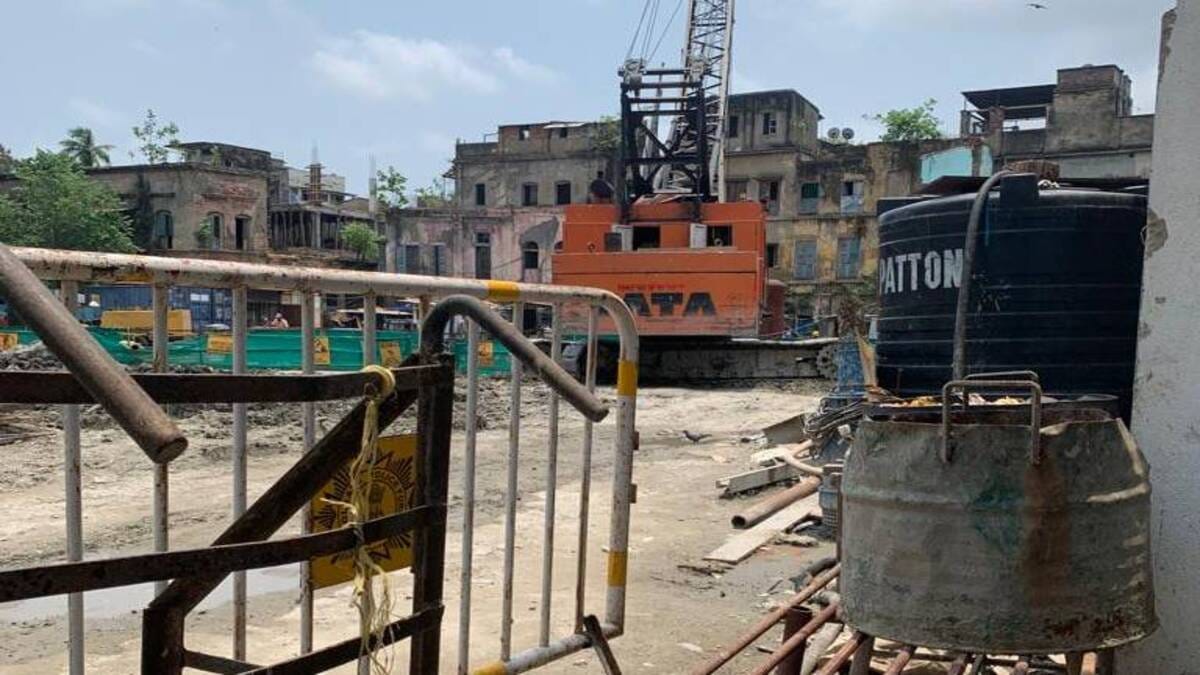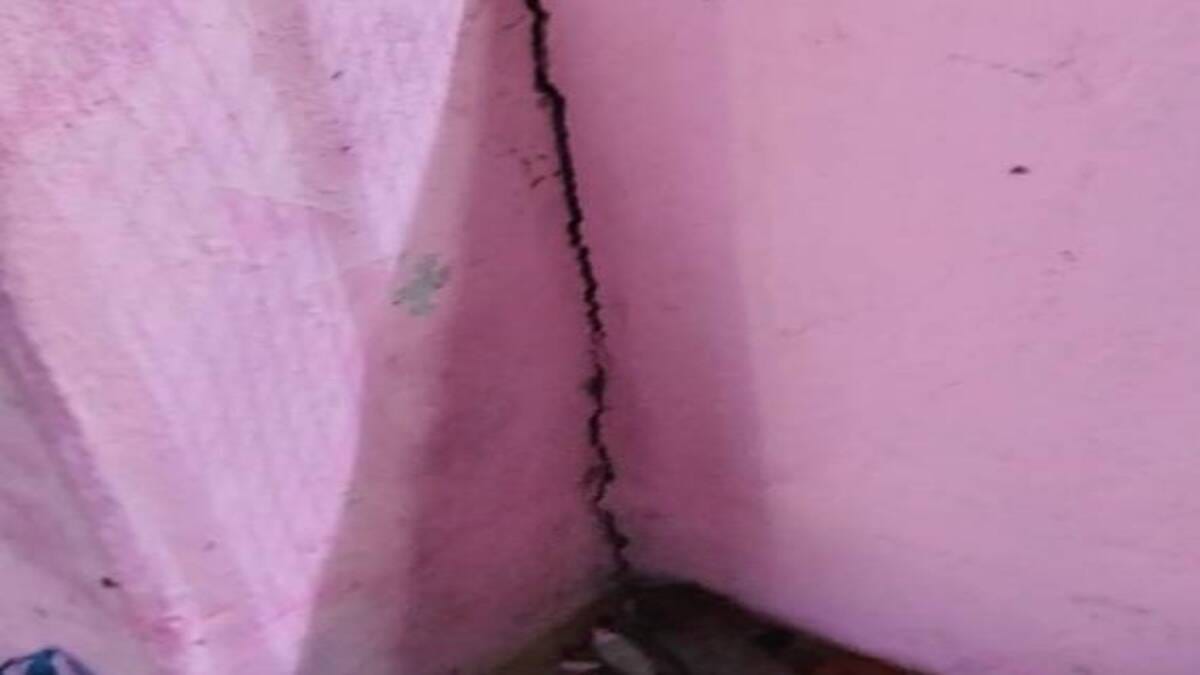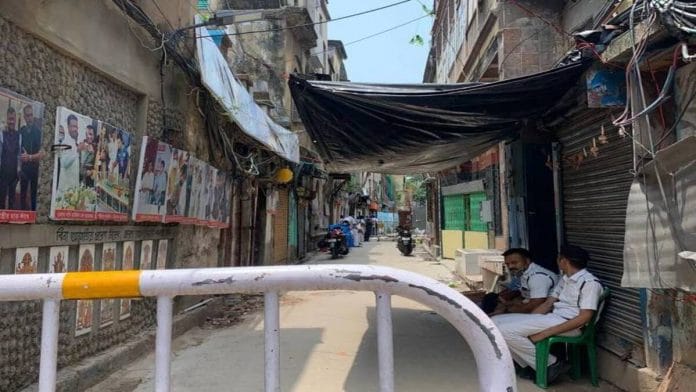Kolkata: Subhashish Das was at work 11 May when his elderly mother telephoned him in a panic. Cracks had developed in the walls of their home, in central Kolkata’s Bowbazar, and she was worried.
When Das rushed back home, he saw the cracks — deep ones — running through the ceiling of the house, and even the floor.
“The horror of 2019 returned,” said Das, remembering the collapse of two buildings in Bowbazar — a congested neighbourhood — amid work to build the big-ticket East-West Metro corridor in Kolkata, which will include India’s first underwater Metro tunnel.
At the time, as many as 18 buildings in Bowbazar were reported to have developed cracks. “But this time the cracks were much bigger,” said Das.
Das lives in the Durga Pithuri Lane of Bowbazar — an area that boasts of several houses over 100 years old.
After the cracks were noticed last week, the houses were evacuated. The Kolkata Metro Rail Corporation Limited (KMRCL), overseen by the Union Railway Ministry, subsequently moved at least 150 residents of the lane to four hotels citing safety issues.

The KMRCL managing director expressed regret for the damage caused and promised repair assistance after the underground construction work was completed.
Kolkata Police and Kolkata Municipal Corporation (KMC) personnel, meanwhile, deployed personnel in the lane with barricades.
KMC Commissioner Binod Kumar told ThePrint after he visited the site that people’s safety was a priority.
He said engineers from the Jadavpur University will submit a report on the condition of the houses. After that, state government authorities will hold a meeting with Kolkata Metro officials.

“We need to investigate why these cracks have appeared. Until we get the entire report from the engineering experts, it’s tough to say anything,” Kumar added.
ThePrint contacted Kolkata Metro General Manager Arun Arora but his phone was switched off. Efforts to get a comment from him were also made through text messages and email, but no response was received.
KMRC General Manager (Administration) A.K. Nandi told ThePrint that this fresh hiccup hasn’t stalled Metro work. “The work is ongoing but it seems that the completion of the project could be delayed by another three to four months for the time being,” Nandi said.
In a press release on 13 May, the KMRC it will constitute an expert committee or engage a reputed institution to investigate “the details of causes of the incidence [sic] and to prepare [a] technical road map for completion of the works”.
Also Read: How Delhi metro prevailed over BRT in the Indian capital’s politics of speed
The Metro rail project
Flagged off in 2009, the East-West Metro will connect Kolkata with Howrah, across the Hooghly river, through a 10.8-km tunnel.
A nearly 6-km stretch will lie under water. The only Metro rail project directly under the Indian Railways, the corridor will also connect east and west Kolkata.
The project has been beset with problems from the start. Political changes and land acquisition caused delays — the latest revised deadline for the completion of the entire east-west corridor is January 2023, pushed back from June 2022 due to Covid 19 and the 2019 incident.
A section of the East-West Metro corridor — from Phoolbagan to Sector V — has been already operational since October 2020.
Apart from all this, the KMRC has another lingering problem: Safety.

It was only last month that Kolkata Metro authorities extracted the two tunnel boring machines — Urvi and Chandi — that were stuck underground during the tunnelling process in 2019.
The building collapse that year was blamed on Chandi hitting an aquifer underground, leading to an uncontrollable leak.
Manasi Bhuiyan, 35, remembered how a portion of her house — renovated in 2016 — collapsed in 2019.
“My father immediately called the Kolkata Metro engineer who was on duty in 2019 to tell him cracks were reappearing,” she said. “It was a close shave, thankfully, none of the residents were injured. Can you imagine the fear we are living in since 2019? This can occur anytime, and I can tell you, it’s happened before and I’m sure it’ll happen again.”
When the buildings collapsed in 2019, Metro officials had assured the residents that their homes were safe to return to, residents claimed. Fitness certificates were handed over to a few families while the rest received a phone call in this regard.
The homes that were heavily damaged were to be rebuilt by the Metro but that work is yet to begin, residents said.
Who’s responsible?
Kolkata Mayor and state minister Firhad Hakim, who visited the site to speak to residents, said at a press conference Saturday that the Kolkata Metro Rail Corporation must apologise.
“There has been a mistake and they need to acknowledge it. The drainage in the area has been choked as well, that too needs to be resolved,” he added. “We have sought a grouting report and soil test report from Metro. We will hold a chief secretary-level meeting once all the reports are in.”
Grouting is described as the process of injecting material into cavities or cracks in concrete, masonry structure, soil, or rock mass to increase the structure’s load-bearing capacity. A soil test is done to understand if the base is strong enough to ensure heavy construction.
For residents who have left their beloved home and all their belongings behind, it’s a time of great uncertainty. Holed up in a hotel, they now wonder if they will ever see their homes again.
KMC Commissioner Binod Kumar confirmed at least three houses have to be demolished now as they pose a threat to people’s safety.
The KMRC has promised to rebuild houses that will be demolished. But for Bhuiyan, whose house is one of those that have been deemed dangerous, nothing short of a written guarantee will do.
“It was the police that rushed in first to rescue us. The councillor and MLA of our area were also present, but it was almost five hours before Metro authorities arrived. We don’t know who’s at fault,” she said.
Das also had the same question.
“Such a sorry affair that central government engineers don’t know how to carry out this project,” he said. “Once the Metro begins to operate, who will guarantee that our homes will not collapse? We also want our future generations to see development, but at what cost?”
“How can Metro authorities be so callous?” he asked. “You can make a mistake once, this incident happened in 2019, but no lessons were learnt.”
(Edited by Uttara Ramaswamy)
Also Read: Neither fast nor on time — CAG report delves into all that ails the Great Indian Railways






